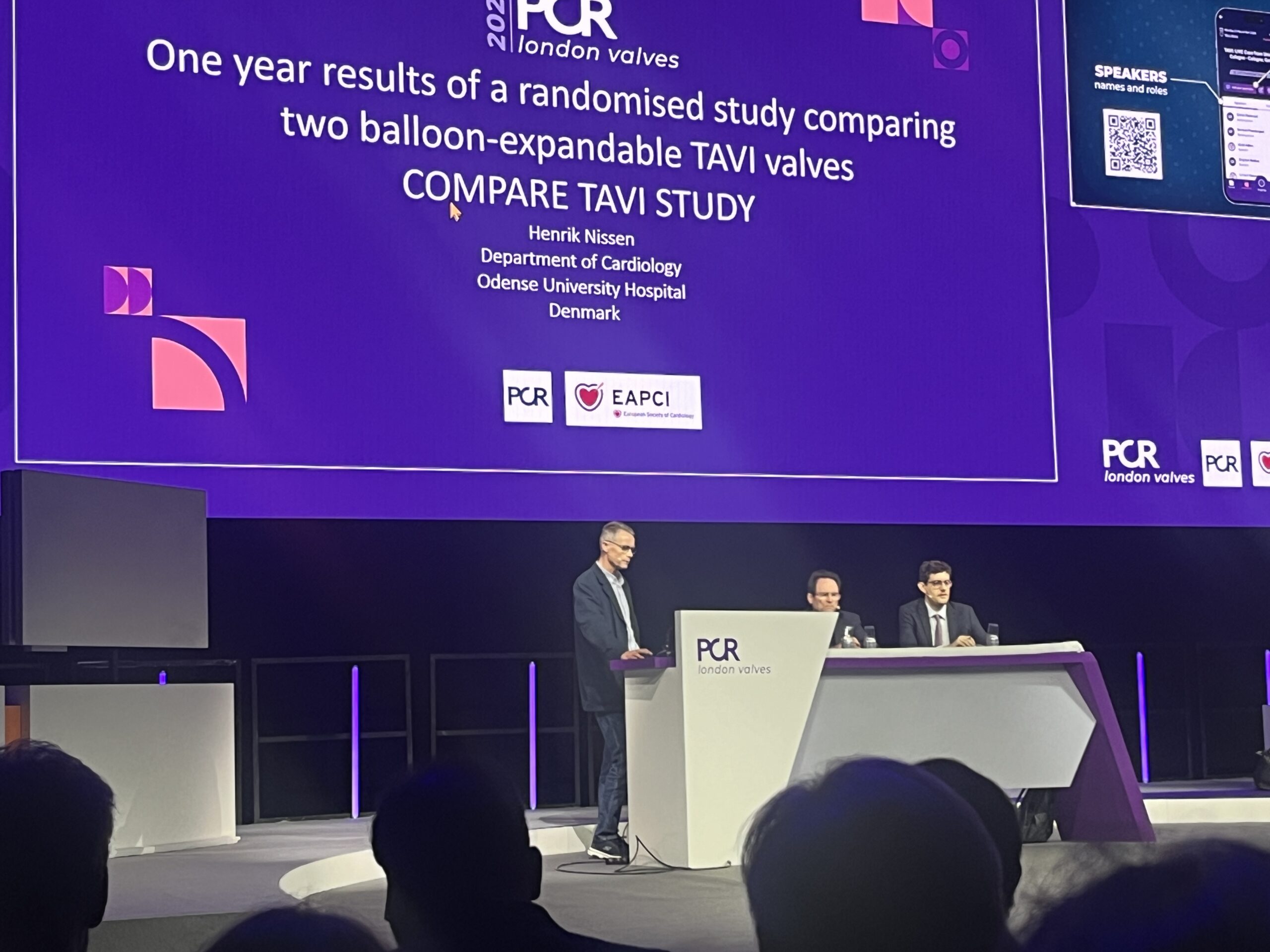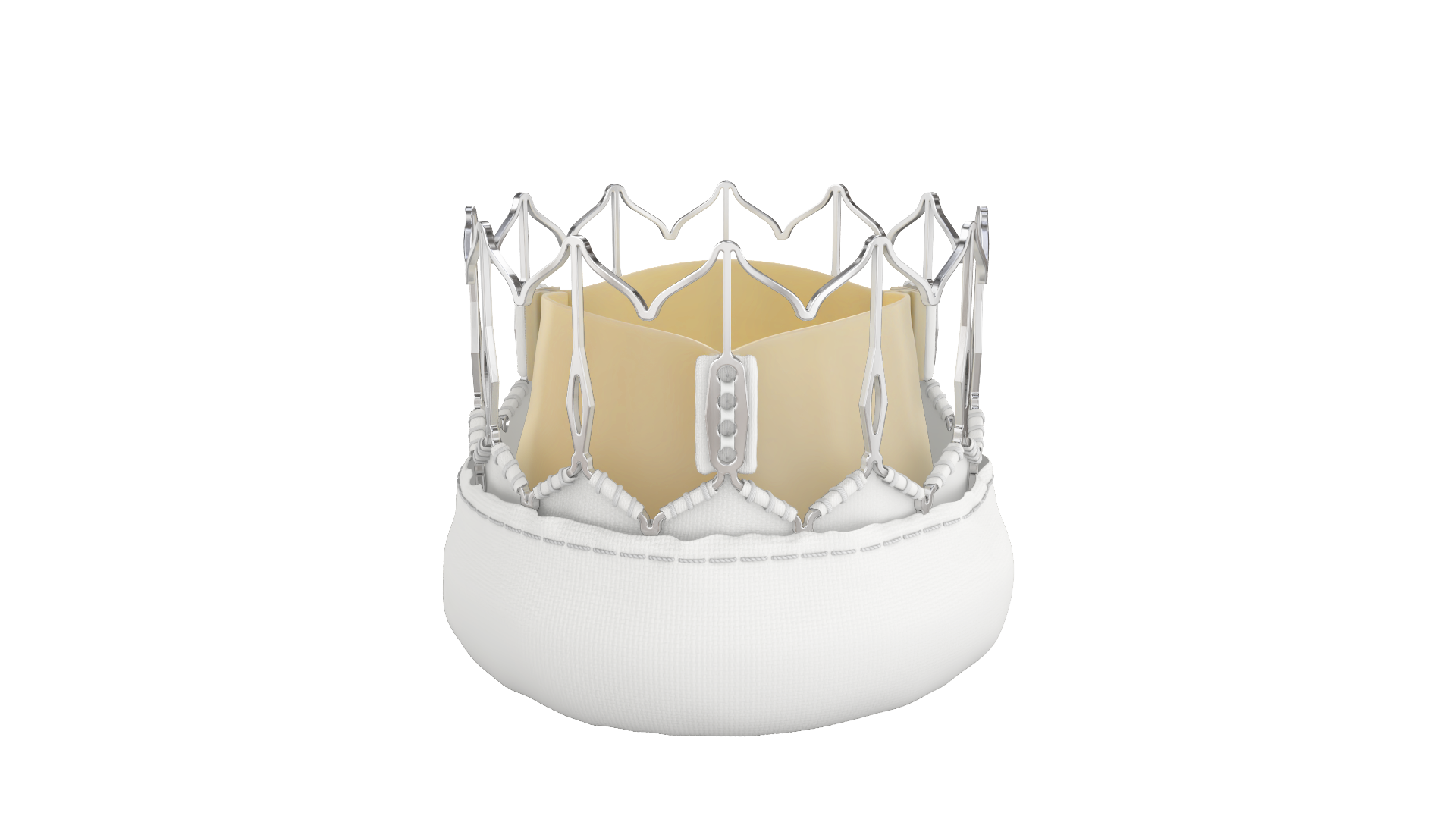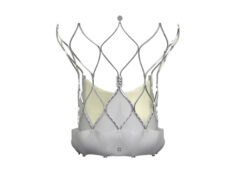
New analysis of the Myval transcatheter aortic valve implantation (TAVI) system (Meril Life Sciences), presented as late-breaking data at PCR London Valves (24–26 November, London, UK), have demonstrated the non-inferiority of the device for a composite of death, stroke, moderate or severe aortic regurgitation and valve deterioration at one year compared to the Sapien (Edwards Lifesciences) system.
Results of the COMPARE-TAVI study were presented by Henrik Nissen (Odense University Hospital, Odense, Denmark) and include outcomes among patients treated at centres in Aarhus, Odense and Aalborg, all in Denmark. Alongside meeting non-inferiority against the trial’s composite primary endpoint (13.8% for Myval versus 13% for Sapien), the Myval THV also exhibited a lower incidence of patient-prosthesis mismatch (17.5% vs. 28.6%).
A differentiating feature of the balloon-expandable valve is its availability in a wider range of prosthesis sizes than the comparator valves, with intermediate valve sizing making it possible for physicians to avoid over- or under-sizing the prosthesis based on patient anatomy.
Previously, results of the LANDMARK multicentre trial, which compared Myval to both Sapien and Evolut (Medtronic) valves, presented by Patrick Serruys (National University of Ireland, Galway, Ireland) at EuroPCR 2024 (13–17 May, Paris, France) showed that the performance of the Myval device in terms of safety and effectiveness was non-inferior to the contemporary devices for the occurrence of a primary composite endpoint of death, stroke, major bleeding, acute kidney injury, major vascular complications, moderate or severe valve regurgitation, and the need for new permanent pacemaker implantation (24.7% vs. 27%).
Further analysis from LANDMARK, presented at PCR London Valves and published in EuroIntervention have confirmed Myval’s non-inferiority to both Sapien and Evolut valve series at 30 days post-implantation.
The results highlighted comparable composite safety and effectiveness outcomes between Myval and Sapien (24.7% vs. 24.1%), with Myval demonstrating a lower rate of permanent pacemaker implantation (15% vs. 17.3%) and superior haemodynamic performance.
Similarly, Myval matched Evolut in composite endpoints (24.7% vs. 30%), while showing benefits in reducing pacemaker implantation rates and moderate/severe valve regurgitation. Effective orifice areas were also comparable between 26mm and 29mm Myval and Evolut devices.
Myval Octapro

Alongside new data underscoring performance of the existing generations of the Myval system, PCR London Valves proved to be a significant meeting for Meril, due to the launch of a new iteration of the Myval series—Myval Octapro—the third generation in the device series.
Meril Life Sciences’ head of international business, Sanjay Yadav, tells Cardiovascular News that innovation and a commitment to research and development are key strategies for the company. An important modification for Octapro compared to previous iterations, he says, is the inclusion of inwardly facing struts on the aortic side, dubbed “V-Chevron”, which are intended to reduce the foreshortening of the valve by as much as half.
“In certain patient anatomies where the coronaries have a low height from the aortic valve, it is very important to have precise placement and positioning. Under fluoroscopy physicians have expressed that that foreshortening is practically eliminated [with Octapro],” Yadav says. “With this precise positioning, which is a key factor in terms of having coronary access, it helps patients in a major way.”
Octapro has initially been launched by Meril in key geographies including Italy and Germany, and the company intends to have this latest-generation platform available in more regions shortly.
Further studies using the Myval devices are ongoing, Yadav tells Cardiovascular News, highlighting three in particular—BASELINE, comparing Myval to a self-expanding device in patients with a failed surgical bioprosthesis; START YOUNG, comparing Myval to aortic valve replacement surgery in patients aged 65–75 years; and PURE TAVI, assessing coronary angiography with or without percutaneous coronary intervention (PCI) alongside TAVI with Myval to standalone TAVI.
*Amended 5/12/24 to reflect that Octapro has not yet launched in the UK.










